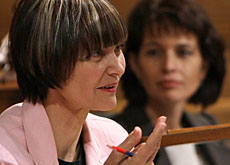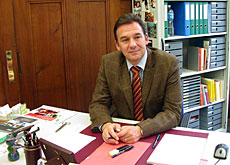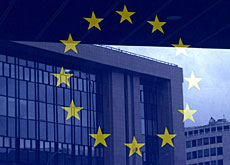Funding for eastern Europe remains intact

Parliament has approved the funding arrangements for the SFr1 billion ($800 million) Swiss contribution to the ten new members of the European Union.
The Senate joined the House of Representatives in agreeing not to make cuts in existing aid programmes to eastern Europe to finance the contribution.
During the final week of summer session, parliament also agreed a separate SFr730 million credit – an increase of SFr80 million – for projects in eastern European countries for the period from 2007 to 2010.
Ahead of a nationwide vote on Swiss payments to eastern European countries in November 2006, the government proposed cutting traditional aid programmes prompting controversy among the main political parties.
The Swiss government pledged a SFr1 billion package during negotiations on a series of bilateral treaties with the EU in 2004. Switzerland is not a member of the EU, but the EU is its main trading partner.
The cabinet had said that some 60 per cent of the payments – SFr30 million annually over a ten-year period – would have to come from both the foreign and economics ministries.
The parties accused the government of wilfully ignoring a parliamentary decision, jeopardising the payments and putting a strain on relations between Switzerland and Brussels.
International obligations
“I interpret your wish to respect a motion [to change the funding arrangement to eastern European states] as a desire to not want to reduce development aid,” said Swiss President Micheline Calmy-Rey on Monday.
The separate increase in funding for eastern Europe would also help contribute to maintaining Switzerland’s overall contribution towards development aid, which had dropped to 0.39 per cent of GDP in 2006, Calmy-Rey explained.
The Swiss government has promised the United Nations that it would look again at the possibility of increasing development aid from 2008.
“The Senate decision to increase funding to eastern Europe and to leave development aid untouched goes towards respecting our international obligations,” she added.
Three motions put forward by the Swiss People’s Party asking for Swiss contributions to eastern Europe to be frozen while the EU refuses to officially recognise Switzerland’s tax system were rejected by the Senate on Monday.
swissinfo with agencies
Breakdown of Swiss contribution to eastern European states (in SFr):
Poland: 489,020,000; Hungary: 130,738,000; Czech Republic: 109,780,000; Lithuania: 70,858,000; Slovakia: 66,866,000; Latvia: 59,880,000; Estonia: 39,920,000; Slovenia: 21,956,000; Cyprus: 5,988,000; Malta: 2,994,000.
Switzerland has been granting financial aid to countries in eastern Europe to help them transform into market economies.
As part of the second set of bilateral treaties with Brussels, non-EU member Switzerland pledged to provide SFr1 billion to ten new EU member states mainly in eastern Europe.
Under the accord, almost half the funding will go to Poland. Hungary will benefit to the tune of SFr131 million, while the Czech Republic will receive SFr110 million.
Since 1990 Switzerland has spent SFr3.5 billion on about 1,000 aid projects in eastern Europe after the collapse of communism.
So far non-EU member Switzerland has agreed 16 bilateral treaties with the 25 EU member states, including the ten countries which joined in 2004.

In compliance with the JTI standards
More: SWI swissinfo.ch certified by the Journalism Trust Initiative



You can find an overview of ongoing debates with our journalists here . Please join us!
If you want to start a conversation about a topic raised in this article or want to report factual errors, email us at english@swissinfo.ch.